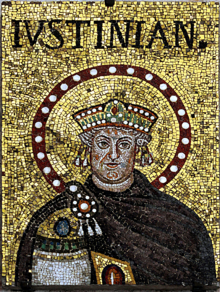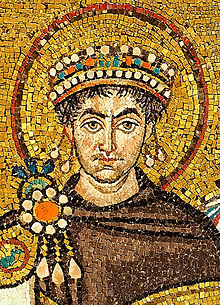Editors’ note:
To contextualise this section of Vol. II of Karlheinz Deschner’s encyclopaedic history of the Church in 10-volumes, Kriminalgeschichte des Christentums, see the abridged translation of Volume I.
Emperor Justinian, dominator of the Church
Justin died on August 1, 527 at the age of 76, when an arrow wound reopened in the foot, followed by his nephew Justinian. Justin first energetically removed his nephew, as he did not want to release the helm of the State. It is probable, however, that Justinian was from the very beginning the guiding spirit of Justin’s politics.
 Justinian I (reign: 527-565) son of Macedonian peasants as his uncle, but exquisitely educated, was forty-five years old when he began his government. He was a piknic [note of the Editor: since this is a German term for a type of physical constitution characterised by broad thorax and short and thick limbs, the very famous portrait of Justinian at the top of this entry might be misleading; the above one might be more accurate], of medium height, round-faced and with premature baldness.
Justinian I (reign: 527-565) son of Macedonian peasants as his uncle, but exquisitely educated, was forty-five years old when he began his government. He was a piknic [note of the Editor: since this is a German term for a type of physical constitution characterised by broad thorax and short and thick limbs, the very famous portrait of Justinian at the top of this entry might be misleading; the above one might be more accurate], of medium height, round-faced and with premature baldness.
Probably a dynamic type, a man full of contradictions and enigmas, at that time and in our day a demigod or a devil according to the angle from which we look at him. The liveliness of his spirit mixed with an almost exceptional capacity for work and also with distrust and envy. He was thorough, energetic, somewhat fabulous and simulator; an unscrupulous intriguer. He ate little and sometimes fasted for several days. He wanted to do everything himself, as corresponds to a human type obsessed with activity, so in love with the detail that his actions often scratched pedantry.
He used to sleep little, the ‘sleepless emperor’. He must have spent many nights arguing with bishops and men of great holiness. ‘The night’, says Procopius, a model of Byzantine historiography in his Secret History, ‘he spends it sitting, talking without surveillance […] and intends to subtly unravel the enigmas of Christianity with the help of old priests’. He ruled the world without just leaving his palace, from his desk, so to speak. With the help of his generals Belisarius and Narses he forced the re-conquest and reconversion of the West to Christianity.
Three-quarters of his reign, which lasted almost forty years, were engaged in wars. In spite of all this he felt like a representative of God on Earth and consequently also as the supreme leader of the Church: like all Byzantine emperors, both from the early and late imperial times. The patriarch was nothing other than the bishop of the court like any other patriarch, as the pope. He described his signature as ‘divine’, his property and himself were ‘sacred’ (the popes would soon adopt that ‘sacredness’). All the buildings in his palace were sanctified. Let us remember the behaviour of Constantine I, the Saviour, the Redeemer, who called himself ‘Our Divinity’.
If Justinian shows signs of incessant political activity, it is no less the one that unfolds in the theological to the point that it could well be said that he had erred in his profession. Naturally, only before some he could appear as an expert. For others he was simply a kind of an unhappy fan of theology, an amateur. Although he was, almost until the end of his days, a Catholic of firm adherence to the doctrines of Rome—not exempt, however, from opportunistic trajectories in zigzag—he felt as a legislator of the Church, as his master and lord.
It is he who sets the dates of the synods, who reserves the right to convene an ecumenical council and to sanction the council canons by matching them to the laws of the State. He solves the problems of faith autocratically and promulgates decrees concerning the faith. He occupies the bishop’s headquarters according to his discretion, something that had been done, for a long time, in the East. But he is not only a legislator of the Church, he not only decrees ‘what requirements the ordination of bishops or other members of the clergy must meet’, ‘what life the monks should lead’, etc., but is also the author of works of theology and even writes sacred hymns.
As he ages so much more intense and unambiguous is his dedication to theology. He builds Hagia Sophia and presumably spends 320,000 pounds of gold on it. Under his rule, churches and monasteries emerge like mushrooms in all provinces. His constructive passion is, if possible, even greater than that of Constantine I. Justinian, whose desire is the restoration of the empire, is not only the dominator of Catholica, but is also recognised as such by the Roman bishop, by the city of Rome. From Pelagius I (556-561) the West must have the imperial confirmation of the election of a new pope before proceeding to consecrate himself.
